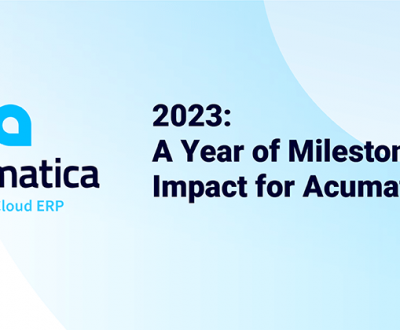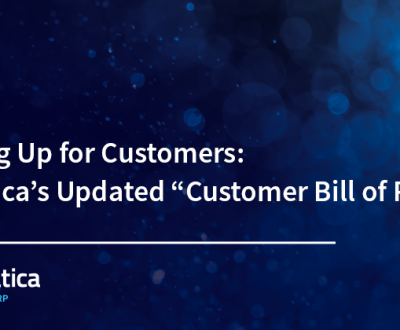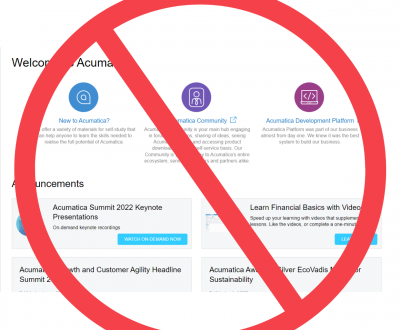The 3 Key Differences Between Financial Management and Accounting
- 18/01/2024
- Accounting Software, Acumatica, Cloud, UK
Acumatica’s James Mallory explains the differences between—and importance of—financial accounting and financial management.
What’s the difference between finance and accounting? It’s a common question and one that should be asked by every person involved in running a business or interested in seeing that a business succeeds (e.g., business owners, managers, and investors). Understanding why financial accounting differs from financial management ensures that a business’s finances are structured for success.
Today, we’ll define, examine the objectives, and provide a real-world example of these important finance functions.
What is Financial Accounting (or Managerial Accounting)?
Simply put, managerial accounting is the management of current financial information, which includes identifying, monitoring, analyzing, and dispersing it. Business leaders, such as managers, use the information to make wise business decisions regarding the day-to-day operation of the business.
Managers are—for all intents and purposes—the hub of the business wheel. They are responsible for hiring and directing employees, organizing daily operations, and reporting to executives. They’re also responsible for helping the business meet its financial goals through budgeting, forecasting, and product costing—all of which is only possible if they have accurate, updated financial information in hand.
What is Financial Management?
Financial management focuses on the overall financial health of a business. The financial management team produces financial statements (e.g., balance sheet, income statement, and cash flow statement), informing external stakeholders—such as stockholders, investors, board of directors, creditors, and financial institutions—on how well a business has or has not performed over a specific period of time.
External stakeholders use a business’s financial statements, which are reported on a quarterly and annual basis per the U.S. Securities and Exchange Commission (SEC) requirements, to evaluate its performance and cash flow to determine whether they should invest in a business or not.
Key Differences Between Financial Management and Accounting
Financial management and accounting are both finance functions, but there are three key differences.
- Target Audience
When comparing financial vs. accounting management, one of the main distinctions is who utilizes the financial information. As discussed, financial accounting is tailored for internal management use. Managers and other business leaders use the information to track revenue and expenses, pay taxes, and manage bills.
In contrast, financial management is geared towards external collaborators who analyze financial statements in order to research a business’s revenue, expenses, debt load, and more.
- Reporting Standards
Accounting is more flexible than financial management when it comes to reporting. Because accounting reports are used to make internal business decisions, they can be adjusted based on the end-user’s specific needs and goals. This financial information enables managers and other leaders within a business to control spending and enhance profitability.
Financial management reporting, on the other hand, is subject to specific accounting practice rules known as Generally Accepted Accounting Principles (GAAP). TechTarget defines GAAP as “a collection of commonly followed accounting rules and standards for financial reporting.”
Publicly traded companies in the U.S. are required to follow GAAP while private companies are not. That said, most private businesses recognize that following GAAP will help them provide accurate, consistent financial statements to outside stakeholders should they need or desire additional funding in the future.
- Future Planning vs. Past Performance
The financial information provided through management financial accounting and financial management aids businesses in making informed decisions, but each finance function varies in how and why the information is used.
For example, leadership team members responsible for maintaining operations, setting budgets, and analyzing forecasts—in other words, future planning—use information supplied by the accounting department. Team members responsible for growing the company’s wealth and assets uses the business’s past performance to highlight its viability for investment.
Practical Applications for a Real-Life Business
So, now that we’ve delved into financial management and accounting—including what they are and how they differ—let’s look at their practical applications for a real-life business.
Incubeta is a company that provides marketing, technology, data, and creative expertise, helping “brands grow digital in multiple sectors, including retail, travel, finance, FMCG, iGaming, entertainment, automotive, app development and more.” Some of Incubeta’s well-known clients include Google, Amazon, Disney, and HBO.
In 2014, Global CFO Sean Reuben joined Incubeta, and he says the finance operations were in a challenging state. “I couldn’t see any general ledgers; everyone had different charts of accounts, and I was dealing with 10 functional currencies.”
Incubeta’s four accounting teams were using four legacy financial packages that required manual consolidation of their data into Excel. Says Reuben, “It was a real nightmare.”
The executive team recognized the need for a comprehensive business management solution that could centralize and automate their finance functions. Their search for a user-friendly, modern, scalable, and affordable enterprise resource planning (ERP) solution led them to SAP B1, Oracle NetSuite, Sage Intacct, Sage X3, and Acumatica Cloud ERP.
After evaluating each one, Acumatica’s ease of use, unique pricing, and open API convinced Incubeta that Acumatica was the one to beat. “Acumatica’s pricing solution aligned with our acquisition strategy, allowing us to add new users with each business acquired without having to concern ourselves about ballooning costs. We also needed to easily handle multiple currencies in one integrated solution.”
With help from Acumatica partner and South African-based Palladium Business Solutions, Incubeta implemented Acumatica. Implementation benefits included a lowered technology budget, remote work capabilities, and increased user adoption of the intuitive solution.
As to their financial management and accounting needs, Incubeta team members can now:
- Easily review general ledgers and access detail to the granular level. “I could dive into a legal entity and look at an account to see what was going on versus just seeing a trial balance and having to call and ask people for information.”
- Standardize financials: “We have a standing meeting every two weeks between the financial team and (implementation partner) Palladium where we talk about business improvements and what ifs, and some really good solutions have emerged. We’ve started to use Power BI, and now have the ability to select and transform data from each currency and pull them into one dashboard. That’s brilliant.”
- Add acquisitions rapidly and easily: “Since launching on Acumatica we acquired two businesses, one in the U.S. and another in Northern Ireland. We’ve brought them on very quickly into our accounting structure, allowing us to visualize reporting, which was a massive benefit for us.”
By connecting its multiple accounting solutions and centralizing their global operations onto Acumatica, Incubeta has the managerial accounting capabilities that will help them keep their growing operation running smoothly, and, should the need arise, the financial management functionality that can help it secure capital from external stakeholders.
Says Reuben, “We continue to improve our utilization of Acumatica and derive efficiency through business process audit and finance process review within a program of continuous improvement.”
Financial Management and Accounting Success with Acumatica
To recap, financial management and financial accounting are two separate but vital business functions. The objective of financial management is to manage a business’s assets efficiently and effectively so that they improve the business’s financial performance, whereas the goal of financial accounting is to produce financial information that helps internal business leaders decide how best to fund their business’s daily operations so that they continue without interruption or issue.
As the marketplace continues to evolve, businesses can use Acumatica’s financial management and accounting features—including out-of-the-box and personalized reports, automated processes via AI with machine learning, and best-in-class accounting applications—to take advantage of today’s opportunities and plan for tomorrow’s opportunities.
Learn about how Acumatica’s award-winning cloud ERP solution empowers businesses to innovate, collaborate, and anticipate what’s next.
Tascoli are dedicated to bring you the latest information about ERP and how it can benefit your business. We implement, integrate and offer on going support to Acumatica ERP UK, Sage 300 UK and QuickBooks Enterprise Solutions UK (now discontinued).
About us
Tascoli are an ERP and accounting software services company in the UK and Europe. Our passion is your business efficiency.
Request a Demo
Contact us to receive a demonstration and quote for replacing you ERP system.









